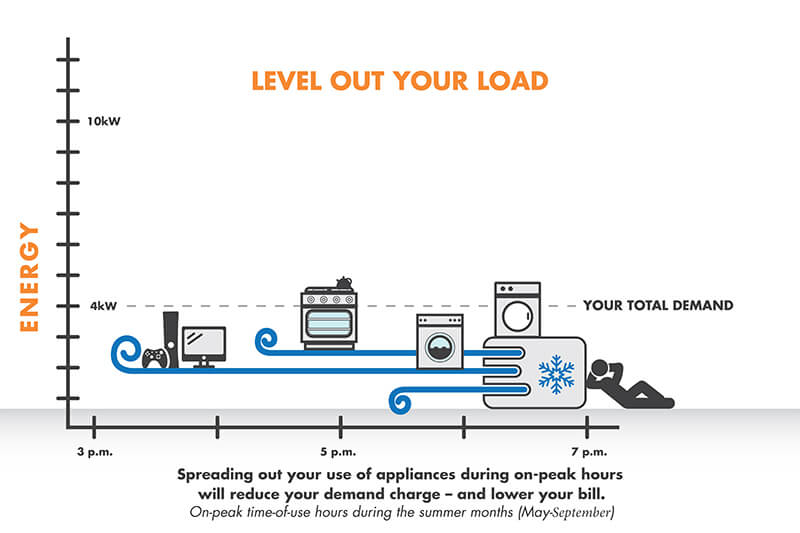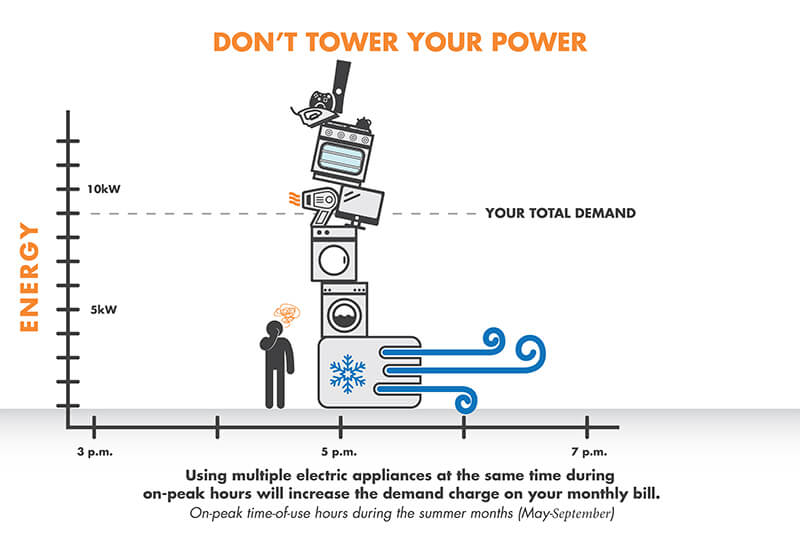
Peak Demand
If you can avoid using a lot of energy at any one time during on-peak hours, our residential Peak Demand pricing plan might be right for you.
How does Peak Demand work?
This plan combines lower usage-based rates with a “demand” charge based on your highest hourly usage during on-peak hours. If that hourly peak greatly exceeds your average use, this plan could increase your costs. But if your usage is relatively steady and you can space out energy-intensive tasks, you may enjoy lower energy costs on this plan.
For example, avoiding the simultaneous use of your oven, clothes dryer, dishwasher and other large appliances during on-peak hours will lead to a lower demand charge. Combine this with lower usage-based rates and you have the power to reduce your monthly bills.
ON-PEAK (TIME-OF-USE) HOURS
SUMMER: May-September
| Midnight - 3 p.m. | 3 - 7 p.m. | 7 p.m. - Midnight | |
| MONDAY-FRIDAY | OFF-PEAK | ON-PEAK | OFF-PEAK |
| WEEKENDS & MAJOR HOLIDAYS | OFF-PEAK | ||
Major holidays include Memorial Day, Independence Day (July 4), and Labor Day. If Independence Day falls on Saturday, the weekend schedule applies on the preceding Friday, July 3. If Independence Day falls on Sunday, the weekend schedule applies on the following Monday, July 5. All weekends are off-peak.
WINTER: October-April
| Midnight - 6 a.m. | 6 - 9 a.m. | 9 a.m. - 6 p.m. | 6 - 9 p.m. | 9 p.m. - Midnight | |
| MONDAY-FRIDAY | OFF-PEAK | ON-PEAK | OFF-PEAK | ON-PEAK | |
| WEEKENDS & MAJOR HOLIDAYS | OFF-PEAK | ||||
Major holidays include Thanksgiving Day, Christmas Day and New Year’s Day. If Christmas Day and New Year’s Day fall on Saturdays, the weekend schedule applies on the preceding Fridays, Dec. 24 and Dec. 31. If Christmas Day and New Year’s Day fall on Sundays, the weekend schedule applies on the following Mondays, Dec. 26 and Jan.2. All weekends are off-peak.
What are the potential advantages of this plan?
Demand rates empower customers to lower their energy costs by making choices about how they use energy. TEP's service costs are driven by the need to satisfy customers’ highest demand, even if it only occurs once each month. When that maximum usage level goes down, so does the cost of providing all our customers with safe, reliable service.
Our Peak Demand plan is designed to reward customers who do their part to reduce demand on the electric grid during peak usage periods. Reducing the peak energy demand promotes more efficient use of our energy resources and can help limit future rate increases.
What are the potential disadvantages of this plan?
If you use a lot of power at any one time during peak usage periods, your energy costs could increase under our Peak Demand plan. That’s true even if your hourly demand reaches a high level only once during a billing cycle. The Demand Charge reflects the cost of resources and facilities TEP must build and maintain to satisfy even occasional needs.
¹ Includes Energy/Delivery and Power Supply charges but excludes the Purchased Power and Fuel Adjustment Clause charge.
² The maximum one-hour measured demand during the on-peak hours of a billing period. In the summer (May-September), the on-peak period is 3-7 p.m., Monday through Friday (excluding Memorial Day, Independence Day and Memorial Day). In the winter (October-April), on-peak periods are 6-9 a.m. and 6-9 p.m., Monday through Friday (excluding Thanksgiving Day, Christmas Day and New Year’s Day.) All weekends are off-peak.



